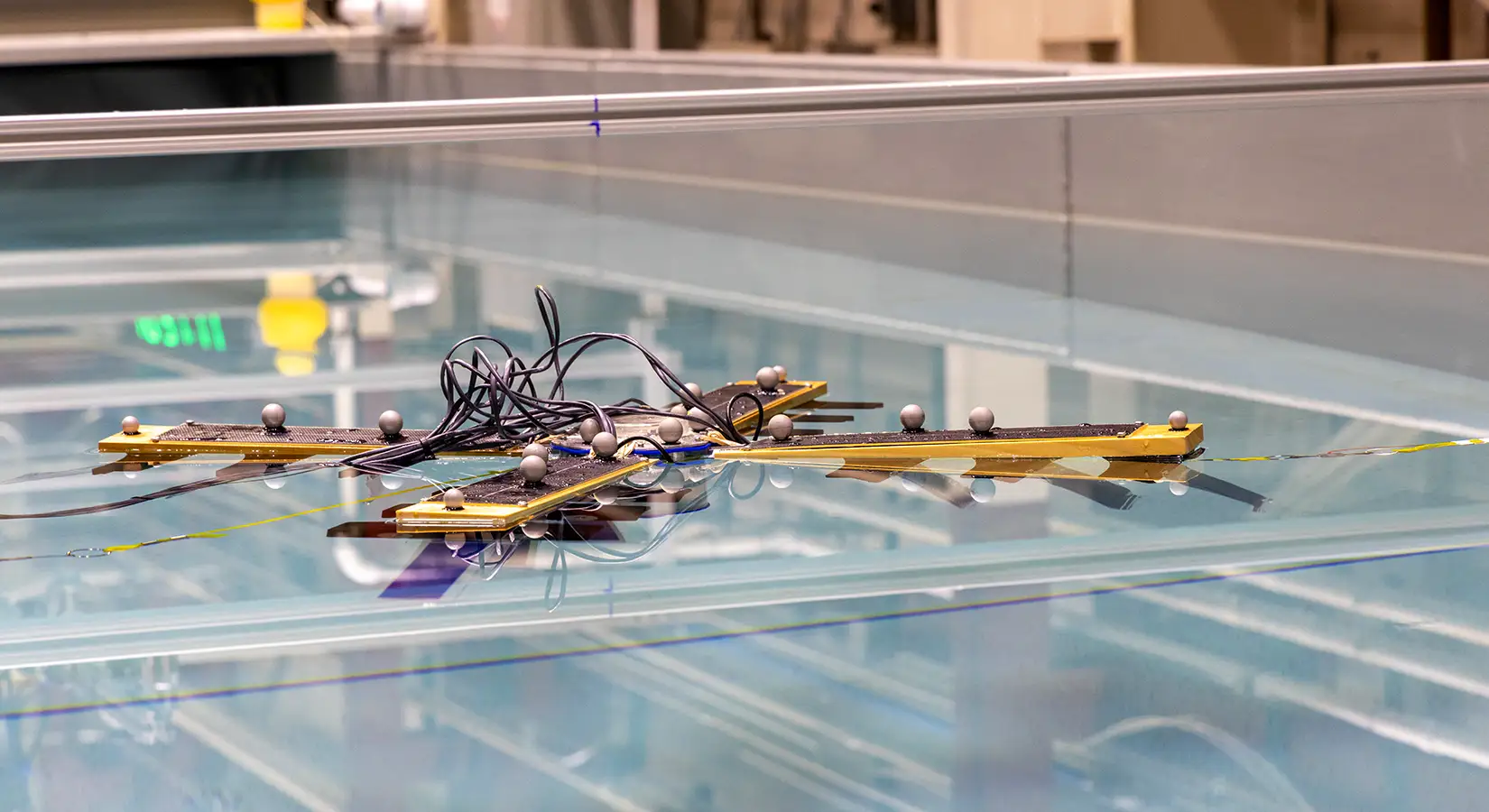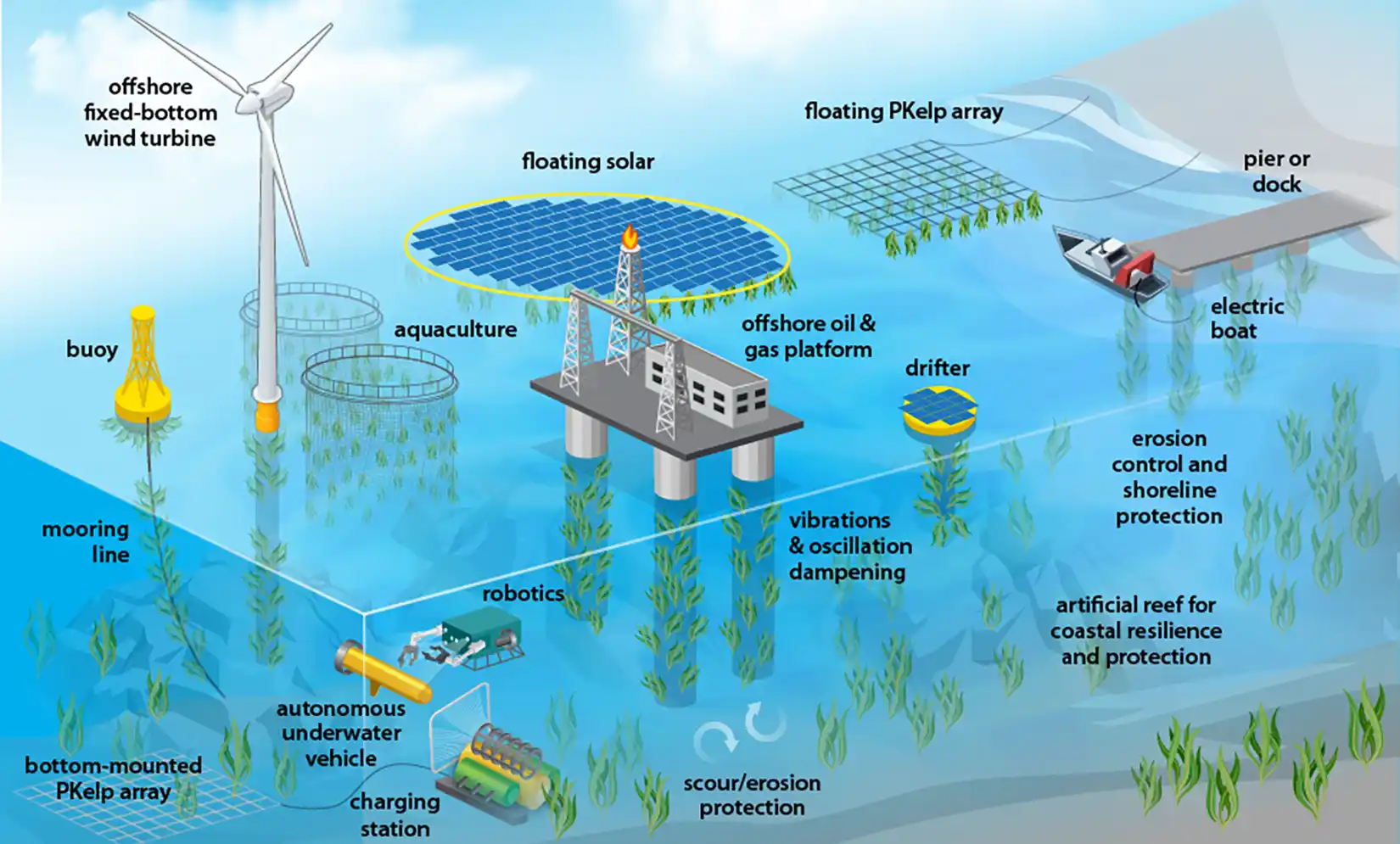PKelp Marine Energy Converter
NLR is co-developing PKelp™, a small-scale device that harvests marine energy and converts it into electricity.
PKelp consists of small, distributed energy converters that work together to produce small-scale electrical power that could be suitable for off-grid applications such as marine monitoring and ocean observation.

NLR and HydrokinetX are co-developing a marine-powered ocean observation device that combines NLR’s PKelp technology with HydrokinetX's remote intelligent platform for sensing technology. Wave tank testing (shown here) is used to validate the integrated system. Photo by Gregory Cooper, National Laboratory of the Rockies
Capabilities
Inspired by living kelp, PKelp is a marine energy converter (MEC) that generates electricity from current and wave motions—including bending, twisting, stretching, heaving, surging, and swaying. When deployed, the device is completely submerged beneath the water surface, enhancing survivability and durability by avoiding powerful, damaging waves from storm conditions. The illustration below shows potential device configurations and locations where PKelp could be deployed.

Illustration by Alfred Hicks and Nicole Mendoza, National Laboratory of the Rockies
Its built-in modularity and redundancy make NLR's PKelp technology robust and scalable to fit various off-grid, small-scale applications. Individual PKelp MECs, or "fronds," can be attached to a variety of offshore structures (such as mooring lines, docks, or even the seafloor) to harvest energy from both waves and currents. Frond dimensions can be adjusted to optimize energy harvesting in different locations.
The technology also benefits from redundancy because it uses multiple PKelp fronds rather than a single large power converter like a traditional MEC. If some of the fronds require maintenance, the system can continue operating, whereas damage to the power converter in a traditional MEC means the entire device must be taken offline for maintenance.
PKelp has the potential to provide off-grid power at sea or in freshwater environments—ideal for blue economy applications such as marine monitoring, autonomous underwater vehicle recharging, aquaculture, and coastal resilience/protection. It is also designed to be installed without specialized equipment.
PKelp is one of NLR's first marine energy converters to be licensed by industry.
Achievements
Noteworthy accomplishments of PKelp include:
- Three wave tank testing campaigns in NLR's Sea Wave Environmental Lab wave tank
- Issued patent, with continuations and international filings
- Approximately $575,000 in funds raised from the U.S Department of Energy (DOE) Water Power Technologies Office's Marine Energy Seedling Program, Energy I-Corps Program, Technology Commercialization Fund, and NLR's Accelerating Innovations to Market Award
- In DOE's EnergyTech University Prize in 2024, University of Michigan students pitched KelpNext, their proposed artificial kelp forest company, which was based on NLR's PKelp technology.
Partnerships
In addition to individual successes, NLR researchers are collaborating with HydrokinetX to use PKelp to power an autonomous floating device. PKelp can expand possible marine energy applications, and NLR is open to collaborations and partnerships on a variety of topics including but not limited to:
- Pilot deployments
- Numerical modeling of fluid-structure interactions and sediment transport
- Experimental test facilities, capabilities, and diagnostic techniques
- Licensing new fields of use.
Contact us to learn more and to collaborate with PKelp and NLR.
Patents
Kelp-Inspired Marine Energy Converter Patent Application
Contact
Group Research Manager, Systems Engineering
Technical collaboration on proposals and pilot deployments
Share
Last Updated Dec. 6, 2025
